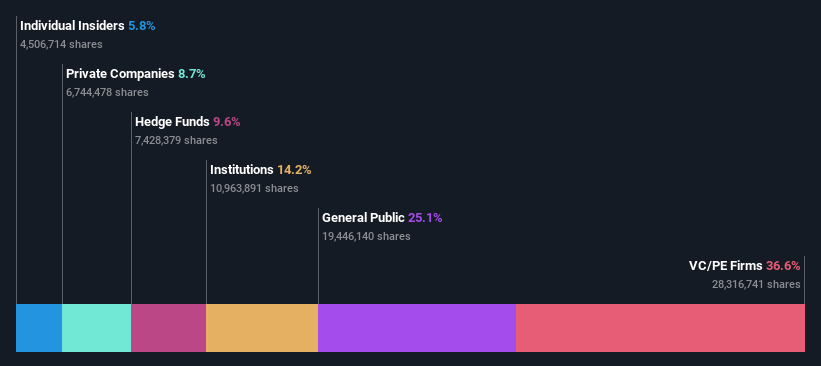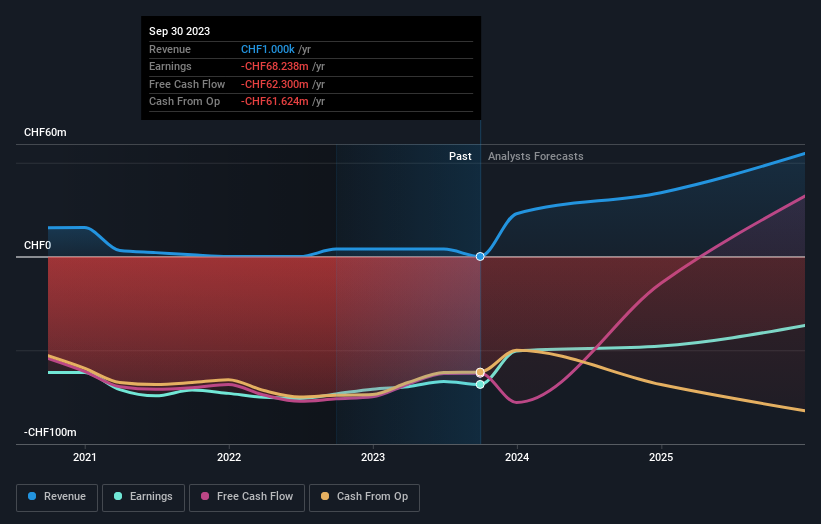AC Immune SA's (NASDAQ:ACIU) top owners are private equity firms with 37% stake, while 25% is held by individual investors
Key Insights
Significant control over AC Immune by private equity firms implies that the general public has more power to influence management and governance-related decisions
A total of 4 investors have a majority stake in the company with 55% ownership
To get a sense of who is truly in control of AC Immune SA (NASDAQ:ACIU), it is important to understand the ownership structure of the business. We can see that private equity firms own the lion's share in the company with 37% ownership. Put another way, the group faces the maximum upside potential (or downside risk).
And individual investors on the other hand have a 25% ownership in the company.
Let's delve deeper into each type of owner of AC Immune, beginning with the chart below.
Check out our latest analysis for AC Immune
What Does The Institutional Ownership Tell Us About AC Immune?
Many institutions measure their performance against an index that approximates the local market. So they usually pay more attention to companies that are included in major indices.
As you can see, institutional investors have a fair amount of stake in AC Immune. This suggests some credibility amongst professional investors. But we can't rely on that fact alone since institutions make bad investments sometimes, just like everyone does. It is not uncommon to see a big share price drop if two large institutional investors try to sell out of a stock at the same time. So it is worth checking the past earnings trajectory of AC Immune, (below). Of course, keep in mind that there are other factors to consider, too.
It looks like hedge funds own 9.6% of AC Immune shares. That worth noting, since hedge funds are often quite active investors, who may try to influence management. Many want to see value creation (and a higher share price) in the short term or medium term. The company's largest shareholder is dievini Hopp BioTech holding GmbH & Co. KG, with ownership of 21%. For context, the second largest shareholder holds about 16% of the shares outstanding, followed by an ownership of 9.6% by the third-largest shareholder. In addition, we found that Andrea Pfeifer, the CEO has 3.1% of the shares allocated to their name.
Our research also brought to light the fact that roughly 55% of the company is controlled by the top 4 shareholders suggesting that these owners wield significant influence on the business.
While studying institutional ownership for a company can add value to your research, it is also a good practice to research analyst recommendations to get a deeper understand of a stock's expected performance. There are a reasonable number of analysts covering the stock, so it might be useful to find out their aggregate view on the future.
Insider Ownership Of AC Immune
While the precise definition of an insider can be subjective, almost everyone considers board members to be insiders. The company management answer to the board and the latter should represent the interests of shareholders. Notably, sometimes top-level managers are on the board themselves.
Insider ownership is positive when it signals leadership are thinking like the true owners of the company. However, high insider ownership can also give immense power to a small group within the company. This can be negative in some circumstances.
We can report that insiders do own shares in AC Immune SA. It has a market capitalization of just US$299m, and insiders have US$17m worth of shares, in their own names. It is good to see some investment by insiders, but it might be worth checking if those insiders have been buying.
General Public Ownership
The general public, who are usually individual investors, hold a 25% stake in AC Immune. While this size of ownership may not be enough to sway a policy decision in their favour, they can still make a collective impact on company policies.
Private Equity Ownership
With a stake of 37%, private equity firms could influence the AC Immune board. Some might like this, because private equity are sometimes activists who hold management accountable. But other times, private equity is selling out, having taking the company public.
Private Company Ownership
We can see that Private Companies own 8.7%, of the shares on issue. Private companies may be related parties. Sometimes insiders have an interest in a public company through a holding in a private company, rather than in their own capacity as an individual. While it's hard to draw any broad stroke conclusions, it is worth noting as an area for further research.
Next Steps:
I find it very interesting to look at who exactly owns a company. But to truly gain insight, we need to consider other information, too. Take risks for example - AC Immune has 2 warning signs (and 1 which is a bit concerning) we think you should know about.
But ultimately it is the future, not the past, that will determine how well the owners of this business will do. Therefore we think it advisable to take a look at this free report showing whether analysts are predicting a brighter future.
NB: Figures in this article are calculated using data from the last twelve months, which refer to the 12-month period ending on the last date of the month the financial statement is dated. This may not be consistent with full year annual report figures.
Have feedback on this article? Concerned about the content? Get in touch with us directly. Alternatively, email editorial-team (at) simplywallst.com.
This article by Simply Wall St is general in nature. We provide commentary based on historical data and analyst forecasts only using an unbiased methodology and our articles are not intended to be financial advice. It does not constitute a recommendation to buy or sell any stock, and does not take account of your objectives, or your financial situation. We aim to bring you long-term focused analysis driven by fundamental data. Note that our analysis may not factor in the latest price-sensitive company announcements or qualitative material. Simply Wall St has no position in any stocks mentioned.


